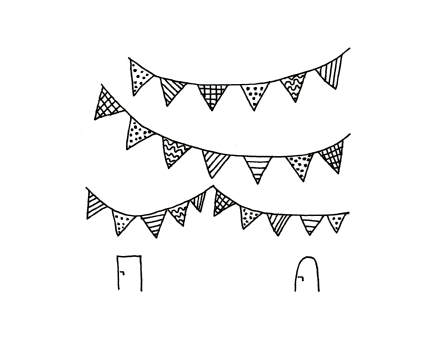
Do you ever wish you knew your neighbours better, or wonder how to connect with new people in your community?
You’re not alone. In fact, your neighbours are probably thinking the same thing.
Refugee Week is a proud partner of The Great Get Together (22-24 June), a weekend of community celebration inspired by the life of the MP Jo Cox.
Jo believed that we have more in common that which divides us, so what better way to mark the end of Refugee Week by coming together in your community to celebrate all that we share.
Your get together could be a street party, a shared barbecue, a picnic or a bake off. It could involve singing, gift-making, cake-baking, language-learning or another of Refugee Week 2018’s 20 Simple Acts (and don’t forget to invite someone new).
If you’d like to try a recipe someone brought with them when they came to the UK, take a look at the delicious dishes from Freedom From Torture’s Tamil community below.
Take a look at the Great Get Together website for resources and updates.
And once you’re all around the table (or picnic blanket) Share your photos on social media using the hashtags #SimpleActs and #GreatGetTogether, or email us.
It all starts with knocking on one neighbour’s door. We bet they’ll be delighted you did.
Sri Lanka: Recipes from Home

From our partners Freedom From Torture
Cooking and sharing food is incredibly valuable to survivors of torture who have been forced to flee their homelands. In many cases the taste or smell of a cake, spice or fresh fruit can help to bring back memories of their loved ones, whilst helping them to re-connect with their culture.
Sri Lanka: Recipes from Home, is a recipe book that draws on torture survivors’ memories of home cooking. With 15 original recipes, illustrated with colour photos and notes, you can read and recreate familiar dishes such as onion roti, dosas and coconut sambal, as well as a variety of delicious curries based around chicken and mutton, and four fish dishes, a staple of Sri Lankan cuisine.
This book is a celebration of food, memories, and Freedom from Torture’s Tamil community.
Recipes
by Tamil Support group member and chef, Yalan*
Vegetable Rice குழசாதம்
“Hindu temples in Sri Lanka offer this very nutritious dish as a sacred food. We cook this dish at home in the UK, and I have seen it being cooked at Hindu temples in the UK” – Yalan.
Ingredients
500 g red rice
250 g pumpkin
150 g tapioca (cassava)
7 green chillies
1 big onion
3 potatoes
1 carrot
1 banana pepper (or green pepper)
½ teaspoon salt
½ teaspoon turmeric powder
2 tablespoons sambar powder
3 tomatoes
1.5 litres water
1 whole head of garlic
1 aubergine
1 piece of ginger
Method
- Cut all the vegetables into small pieces. Finely chop garlic and ginger.
- Wash the rice thoroughly and then put the rice and 1.5 litres of water in a big pan. Bring to boil and boil the rice for ten minutes.
- Add all the vegetables, ginger and garlic.
- Cover the pan and cook for 10 minutes.
- Add turmeric powder, salt and sambar powder and stir well.
- Cover the pan and cook for 30 minutes.
Now the vegetable rice is cooked and ready!
Fish Sothi மனீ்ெசாதி
Ingredients
200 g fish
3 tomatoes
6 green chillies
1 large onion
½ teaspoon salt
½ teaspoon turmeric powder
100 ml coconut milk
200 ml water (approx)
4 cloves garlic
½ teaspoon mustard
¼ teaspoon fennel seeds
½ teaspoon tamarind paste
6 curry leaves
Method
- Finely chop garlic, tomatoes and onions.
- Heat the oil in a pan and when it is hot add the mustard and the fennel seeds and fry until it splatters.
- Add the finely chopped onions, green chillies, garlic and curry leaves. Fry until the onion becomes golden brown.
- Add the tamarind, tomatoes and 200 ml of water.
- Cover the pan and cook for 5 minutes.
- Add turmeric powder and salt. After it boils for 3 minutes add the fish.
- Cook for 10 minutes.
- Now add the coconut milk and cook for a further 5 minutes.
Now the Fish Sothi is ready!
Watalappam வட்டிலப்பம்
“This recipe comes from Sri Lanka and takes me back to my time in Jaffna. I learned how to make Watalappam in the UK from a friend” – Yalan
Ingredients
1 kg Kithul Jaggery (palm sugar)
21 eggs
50 g ginger
600 g coconut milk
25 Cardamom pods
Note: Palm sugar is commonly referred to as jaggery in South Asia where it is widely used. It is brown with a crumbly texture and available in most supermarkets.
Method
- Heat the pan slightly. Add the Kithul Jaggery.
- While it is heating add the crushed cardamom.
- In another bowl add the eggs and finely chopped ginger.
- Beat the eggs and ginger with an electric beater for at least 5 minutes
- When Kithul Jaggery is melted thoroughly remove from fire and let it cool slightly.
- Add the coconut milk into the melted Jaggery mixture.
- Add the beaten eggs.
- Beat this mixture thoroughly, strain and bake in a tray covered with kitchen foil for 1 ½ hours at 160 C.
Sri Lanka: Recipes from Home will be released on World Refugee Day 20th June
For more sweet recipes, see Simple Act 8: Bake a cake
![]()
